Knowing the best means of relapse prevention is one of the greatest indicators of eventual recovery. And while it’s certainly possible to avoid addiction relapse on your own, doing so with the help of a rehabilitation center is proven to be far more effective. There are a wide variety of factors that affect relapsing and having the proper strategies to cope with them is crucial. This list of factors that play a role in relapse prevention includes just some of the ways checking into a rehab center can guide you down the path of recovery. 
1. Get Help from A Qualified Professional
First and foremost, if you want to give yourself the best chance you can get for a full recovery, one of the most important steps is enlisting the help of trained medical professionals. With certain drug abuse rates continuing to climb at an astronomical rate (especially with regards to opioids), a lot of people might be tempted to detox without professional guidance. Treating an addiction at home does have its pros and cons. And while you certainly won’t end up paying as much detoxing at home, you’re not only putting your health (and possibly your life) in danger, you’re also jeopardizing your chances of ever fully recovering. 
2. Learn How to Spot Triggers BEFORE They Pop Up
Triggers are a recovering addict’s worst nightmare. They can come in practically any form: a place, a person, an event, even a smell or a simple sensation. And many times, you won’t even be able to recognize it until you come face-to-face with one in the real world. This can be particularly troublesome because while you may be feeling like you’re in complete control right now, once a trigger pops up it can be difficult to say no to the cravings when you’re in the moment. That’s why rehab centers focus so much on counseling, talk therapy, and other non-medical treatments. Through activities like one-on-one discussion and relapse prevention role play, you’ll be better equipped to identify your triggers beforehand, and learn how to avoid them entirely. 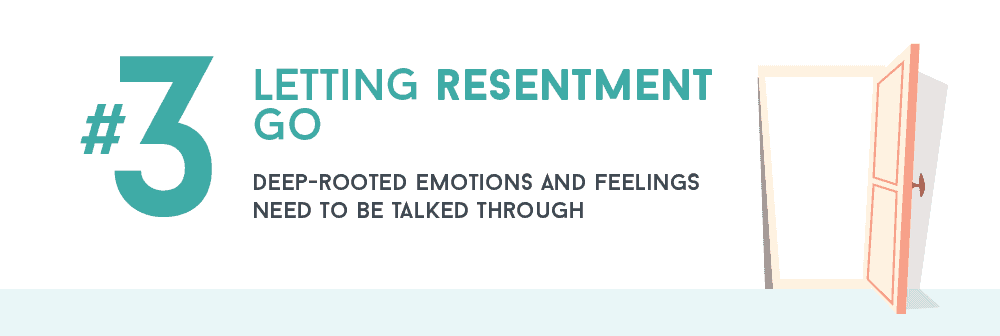
3. Let Go of Your Resentment
Few emotions can be as destructive to your recovery as resentment. Holding onto painful feelings and refusing to move forward plants you firmly in the past, so you can’t look towards the future. The best relapse prevention treatments will encourage you to shed the weight of your resentment, and show you the techniques to do so permanently. 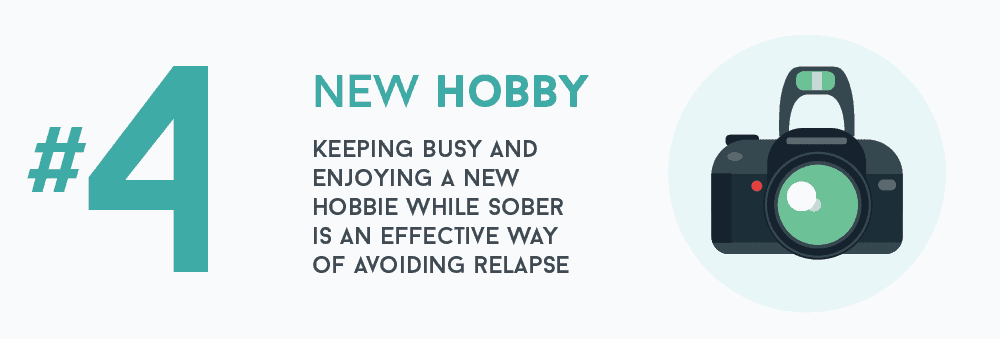
4. Pick Up New Hobbies
An important part of relapse prevention is finding new activities to fill your sober days. Take up reading. Start enjoying the outdoors more. Become a film buff. Whatever you decide, the key here is finding fun relapse prevention activities. And there’s a dual purpose behind doing so. First, having a few hobbies will of course help to keep your mind busy. The less you’re constantly thinking about using, the easier it’s going to be to forget about getting high. Second, engaging in pleasurable activities while being sober can be an incredibly powerful way of showing you that there’s a lot to appreciate in this world. And most importantly, you don’t need to be buzzed to enjoy it! 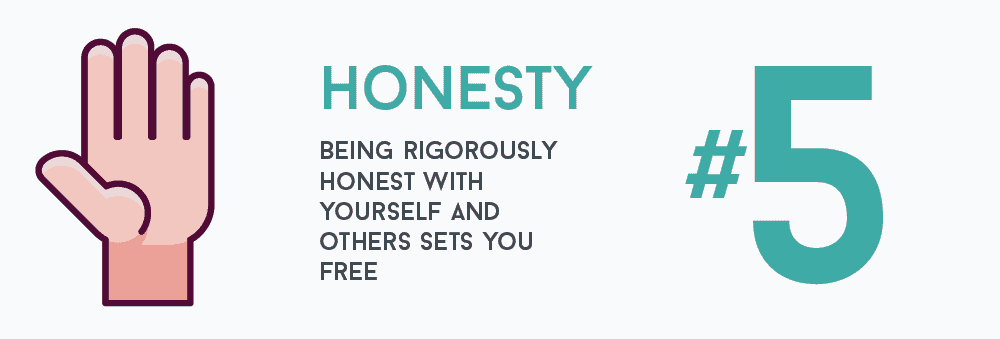
5. Be Honest with Your Friends and Family
You’d be hard pressed to find a facility that doesn’t consider a commitment to honesty to be one of the major relapse prevention topics worth living by. In fact, Alcoholics Anonymous actually considers “rigorous honesty” to be instrumental in recovery. And though it may be difficult to broach the topic initially, doing so can have a variety of benefits. For one thing, by cluing your loved ones in on such a difficult time in your life, you’re establishing trust, the foundation upon which every healthy relationship is built. Plus, you’ll also be expanding your support network, a proven strategy for mitigating relapse. 
6. Find A Proper Dual Diagnosis Treatment Center If Needed
You might be surprised to learn that many times, sufferers of a substance use disorder will also be afflicted by another mental disorder at the same time. In fact, the Substance Abuse and Mental Health Services Administration found that over 40% of substance abusers were also juggling the effects of another mental disorder at the same time. And worse yet, these disorders will typically exacerbate each other along the way, making each worse than if they were experienced alone. The solution? Factor in a dual diagnosis clinic into your relapse prevention plan. This will ensure your treatment plan is catered to your specific mental needs and, of course, help increase your odds of a full recovery. 
7. Take Advantage of Your Recovery Resources
Many facilities will provide relapse prevention material that you can take home with you once your initial stages of treatment are complete. A relapse prevention workbook, for example, can give you a physical resource to turn to when times get tough and your cravings start to feel overwhelming. What’s more, these resources can serve as a reminder of what you learned over the course of your treatment. Triggers, coping techniques, future goals, and more may all be laid out for your reference and could be instrumental in staving off temporary lapses in judgement. 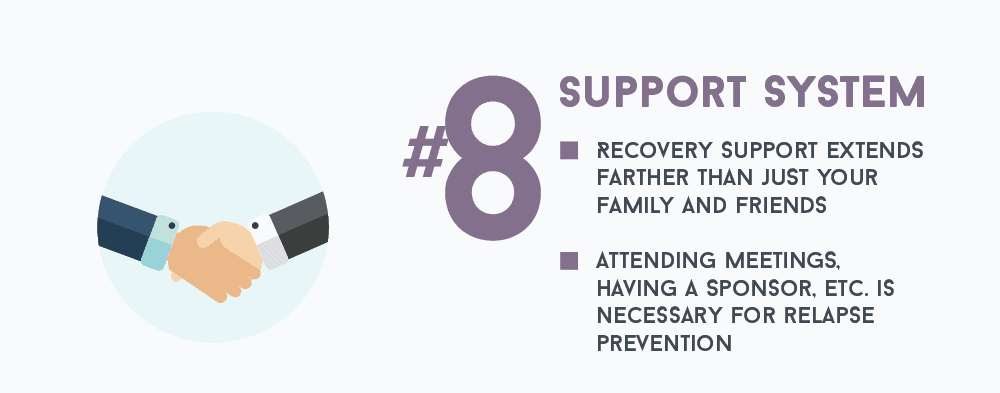
8. Use Your Support System
All too often a patient will walk out the doors of a treatment facility and think, “I’m cured!” But the hard truth is full recovery is usually a long and trying process. And unfortunately, many people will need to continue working on their addiction long after they leave treatment. In addition to the relapse prevention exercises you learned during rehab, maintaining and using your support system is one of the best ways to seal your substance use recovery. And while the support of a loved one is crucial during this time, attending meetings with other former addicts can be just as important. After all, there’s no one better to help you deal with your problems than someone who’s experienced the same ones firsthand. 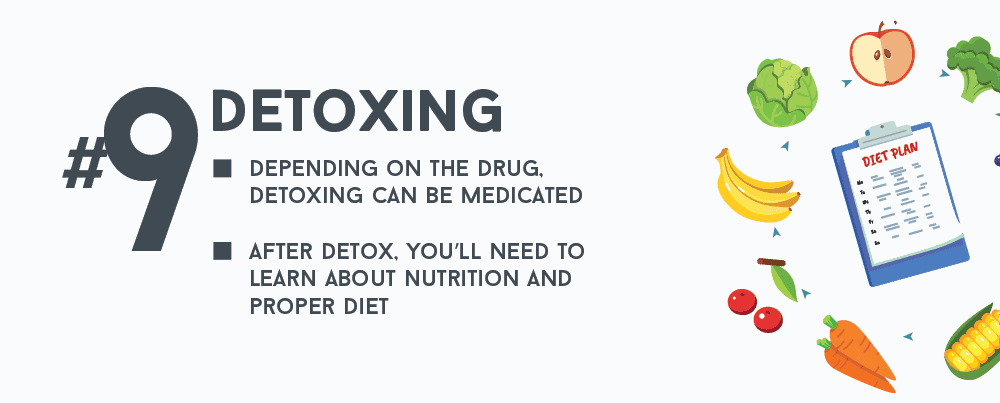
9. Find Facilities That Offer Detox Services to Match Your Needs
Detoxification is usually the first step in a rehabilitation plan but it’s not always as simple as just quitting the drug. In fact, in order to detox safely, some substance abusers will need the help of additional medication to reduce the severity of withdrawal symptoms. What’s more, some withdrawals can actually be life threatening. Going through them without proper medical guidance, then, may end up costing you your life. That’s why it’s integral to your success that you know how to find the right facilities to meet your specific needs. 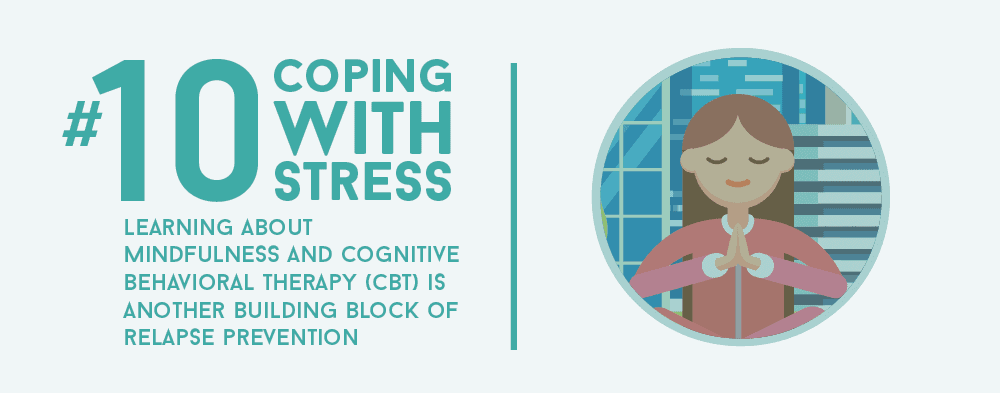
10. Teach Your Body How to Cope with Stress
Stress is one of the first indicators of future relapse. The more stress in your life (and the lower your ability to handle it), the more likely it will be for you to start using again. That’s why many treatment centers focus on teaching their patients relapse prevention coping skills like mindfulness and cognitive behavioral therapy (CBT). What’s more, understanding the interplay of stress and relapse can help you prevent falling back into old habits. The Marlatt relapse prevention model, for instance, teaches that both immediate stressful situations and long-term underlying problems contribute to the overall success of recovery. Learning more about this kind of relapse prevention material can give you the knowledge you need to keep a cool head in trying times. 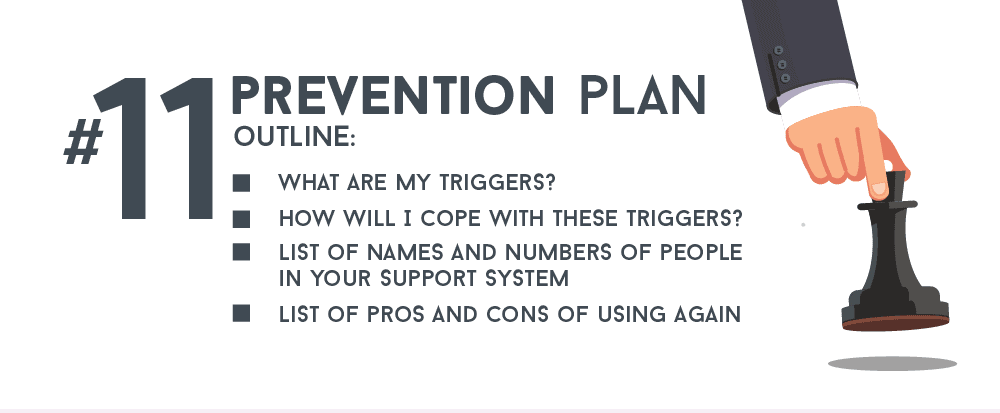
11. Make A Relapse Prevention Plan
Quite possibly one of the most essential parts of your recovery is creating a relapse prevention plan. You’ll likely be participating in a slew of different relapse prevention activities during your time at a rehabilitation center, all of which are made to give you the materials you need to effectively handle relapsing. By writing out a physical relapse prevention action plan that includes such materials, you’ll have something to turn to during events or feelings that end up testing your limits. In general, a relapse prevention plan outline will include several sections such as:
- Triggers that are causing the potential relapse
- A list of coping strategies to help you get through the situation without using
- The names and numbers of people in your support system that can help
- The immediate and long-lasting pros and cons of using again
There are a wide variety of different relapse prevention plan templates that are available for use. Some may have the basic principles while others might be more detailed. The key here is having a guide to refer to once the cravings hit to give you a proven plan of action that’ll keep you from using again. Plus, it’ll help remind you of your reasons for quitting in the first place.
The 11 Factors of Effective Relapse Prevention
You’ll learn more about each of these factors in greater detail during your stay at a treatment facility.
What’s important to recognize, though, is that there are a wide variety of relapse prevention coping skills to help your substance abuse recovery to be as successful as possible.
And the very best way of learning them all is by checking into a reputable treatment facility today.
What Did you Think About This Blog?
Give it a Rating!





